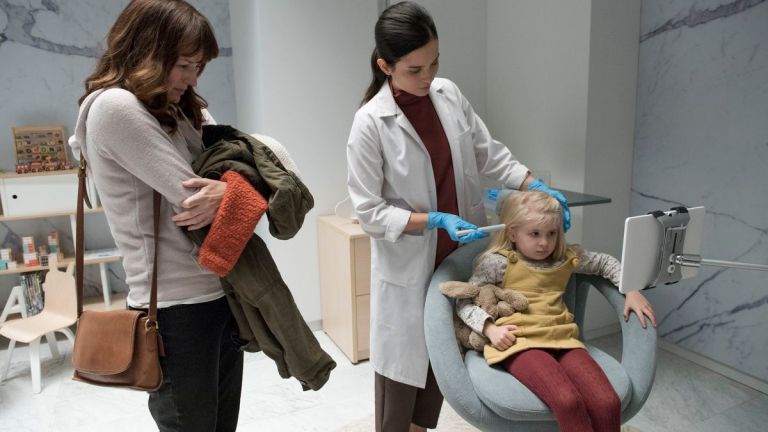Black Mirror Season 4 Episode 2: Arkangel Review
An uncomfortably close mother-daughter relationship is at the heart of Black Mirror's "Arkangel."

My new ritual for firing up a new episode of Black Mirror is trying to guess the inspiration behind each story. Series creator Charlie Brooker has maintained that his program is speculative fiction. Maybe it’s eerie coincidence that his fictional stories set in a near future aren’t that far off from reality. When we spoke to Brooker ahead of season three, he told us that “reality felt like it was slightly catching up with us,” and it “felt like we had to pick up our pace.”
They did. And yet in one way or another, aspects of season three have played out (or are being tested) in real life. So I figured there had to be a point in the series where the technology at least comes close to what we presently have. To an extent, “Arkangel,” the second episode of Black Mirror season 4, is one of the more grounded, if predictable, episodes of the series. But what it sacrifices in that department it all but makes up for with its emotional depth and rich attention to detail, a credit to director Jodie Foster, who was brought in to helm Brooker’s script. You can read more about Foster’s work on the episode right here.
Foster is easily the biggest name to direct a Black Mirror episode thus far, and her approach was to turn it into a little indie movie. “Arkangel” asks us to imagine a not-so-distant future where parents can essentially hack their kids’ brain with a microscopic chip. It allows helicopter parents to not only track their children via GPS, but also monitor things like heart rate, blur out harmful images, and most invasive of all, see through their eyes. This is going exactly where you think it’s going. Single mother Marie (Rosemarie DeWitt), nervous after nearly losing her daughter, Sara, at the playground, opts to try the “Arkangel” procedure. Through a small incision in Sara’s ear, Marie now has nearly full surveillance over her daughter.
Peace of mind, right? Going back to what I said about the episode being grounded in reality… well, it’s partially based on GPS devices for kids that are increasingly more popular. Remember the days when kids didn’t even have cell phones? What the hell did nervous parents do back then? Now that parents have this existing layer of technology to “protect” their children, the concerns are twofold: 1) How will it affect a child’s development? 2) How can that technology be manipulated?
In writing this script, Brooker had a few options. There have been reports that these devices can be manipulated by bad actors and hacked. Already the thought of that has my heart in my throat, and calls back to how anonymous hackers manipulated internet users in season three’s “Shut Up and Dance.” Instead, Brooker opts for a smaller, mother-daughter story that scrutinizes how parents can overstep their boundaries, and what kind of privacy rights children have from their parents, if any.
This could all go wrong if not handled delicately. Brooker wisely enlisted Foster, the first female director in the show’s history, to navigate the rocky terrain of parenthood and what it means to grow up under an intense spotlight as an only child in a single-parent home. Her touch is felt throughout, in particular as Sara grows older and wiser and her relationship with Marie complicates. There are genuine moments of stress, anger, and love that feel more gutting than anything we’ve previously witnessed on this show. On Brooker’s canvas, Foster finds ways to paint in the finer detail; from the ferocious dog barking, to the doe-eyed young girl looking in confusion at her ailing grandpa, and the pre-teen navigating school-yard relationships.
It wouldn’t be Black Mirror, though, without the twist that takes the technology from helpful to invasive. Marie is able to censor harmful images from Sara’s field of view, recalling the scramble we saw in “White Christmas” that blocks people out of others’ lives. In “The Entire History of You,” people can record memory for video via a recorder in their eyes. Here, that ideas becomes more of a livestream for a tablet, leading to the devastating scene where Marie witnesses Sara losing her virginity, and eventually Marie prevents her daughter’s pregnancy behind her back. It’s a gross invasion of privacy and boundaries, and yet viewers can still have some (maybe a tiny bit at this point) empathy for Marie as a mother wanting what’s best for her daughter.
It’s a cautionary tale of helicopter parenting gone horribly wrong, and a gripping little indie for a show that explores big speculative and science fiction concepts. The episode’s climax has all the tension of an already difficult mom-teen relationship further complicated by technology. I still think it would have been more impactful had Marie not made it out alive, but like few Black Mirror episodes, it leaves the door open for a potential reconciliation – one day.
